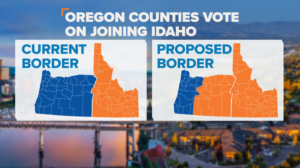More precisely, they’re voting on whether to redraw state boundaries by leaving Oregon and joining Idaho (see map below).
The motivation is partisan. “Conservative residents in eastern Oregon [want to] part ways with their liberal neighbors to the west. If successful, Oregon’s border would shift 200 miles west, according to the measure.” (Read story here.)
That’s misleading. If you read the fine print, they’re only voting on this question: “Should Crook County represent that its citizens support efforts to move the Idaho state border to include Crook County?”
Which has no legal weight whatsoever. Shifting state boundaries is possible, but as Brookings (a liberal think tank) explains here, that “requires approval by both the legislatures of the affected states and by Congress.” Thus, such plebiscites are merely shows of public support for such a proposal.
The restlessness of eastern Oregonians isn’t unique. There are similar secession and separatist movements in northern California and elsewhere, all of them driven by a burning desire of mostly rural conservatives to “divorce” from liberal neighbors. Put another way, these voters hate being trapped in blue states. (Why not just move to Idaho?) See article here.
Borders aren’t sacrosanct or immutable. They change all the time, frequently, and entire nations come and go. The globe or atlas from your elementary school days is already obsolete. Borders are young in human history, originating from the 1648 Treaty of Westphalia, and Time magazine doesn’t think they’ll survive this century (see article here).
But this discussion begs the larger question of America’s political polarization entering its next stage: Political sequestration as like-minded people increasingly clump together. More Americans are refusing to live with people different from them. This is the subject of a 2004 book titled, “The Big Sort” (get it here), whose author argued this clustering is “tearing us apart.” The result is an “ideologically inbred” country, with dire implications.
Political sorting has occurred in online dating for years; many people refuse to date their political opposites. But it even occurs in the product brands people buy (see article here), prominently manifested by boycotts of certain brands (e.g., Starbucks and Bud Light). Social scientists view this phenomenon as unhealthy. To keep democracy vibrant and thriving, people have to engage with each other (see preceding link). But the trend is the other way.
Ideas like the Oregon ballot measure, which is being voted on today (May 21, 2024), aren’t altogether well thought out. If they get what they want, the blue-county largesse will end, and they’ll have to support themselves. Liberals never tire of pointing out that city taxes support public services in rural red areas, and red states are net beneficiaries of federal taxes and spending (see, e.g., article here).
Most Seattle liberals I’ve talked with about this issue aren’t against paying taxes that benefit their conservative neighbors, because they value community, even if their conservative brethren do not. It’s another tie that binds us together. And while Americans squabble among themselves, when threatened from outside, we’ve come together and pulled together, as we did in World War 2 and after the 9/11/2001 attacks.
But as the Jan. 6, 2021, attack on our democracy revealed, maybe we can’t take that for granted anymore.
